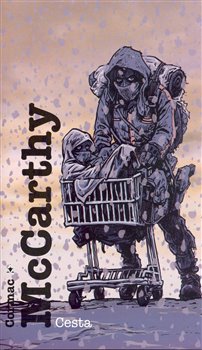The title describes the whole book quite well – a conversation between a seventy-two-year-old father and his forty-two-year-old son. About ninety percent of the book consists of this dialogue between the father and the son, and although the lack of action may seem hopelessly boring, it is, in fact, most entertaining to read about the anecdotes they have to share with each other. The whole conversation takes place during a stroll through Prague and sitting in cafes, but contrary to expectations, it doesn’t give a positive image of the city at all. Instead of following the ‘tourist’ route passing monuments and churches, the main characters walk through weary, derelict neighbourhoods and old, dusty streets. The time that passes in the whole book can’t be more than a few hours; the book takes place in the late afternoon, evening, and night of a warm day in August. Although it would seem that such a book would be way much short, the conversation ‘fills it up.’ The interesting thing is that instead of describing the characters conventionally, Hakl does so through the dialogue, and you get to know the characters by the things they say, rather than through the subjective eyes of the storyteller. The conversation touches a myriad of topics, from women to memories of a lost childhood, memories from the father when he was young and lived in Croatia, from the Russian submarine Kursk to their favourite airplanes. Both speakers talk in Prague slang, which gives the conversation an even higher degree of realism and adds a certain charm to it. The layout of the whole dialogue is done in a very realistic fashion, with subtle shifts in topic. Occasionally the conversation triggers the memory of the son and he plunges into flashbacks. It is interesting to see in what manner the son reflects on the subjects that he and his father just have discussed. These flashbacks play an important role throughout the whole book and gives depth to the story. It is for instance funny to watch the son apologize to his father for something he had broken when he was a child, forty years earlier. The book is a pleasure to read, primarily because of its humour. The down-to-earth feeling of the novel and its intimate content puts it close to the reader, because the talk between the father and the son is one actually everyone should have once in their life. With this novel, in which he has succeeded to uniquely depict a portrait of two generations, Hakl has proven his quality as a writer.

Of Kids and Parents
January 2008, 136 pages
Available material: English translation
Foreign editions: Netherlands (Voetnoot), Bulgaria (Perseus), Austria (Braumüller), Sweden (Aspekt), Poland (Fundacja Pogranicze), Belarus (Lohvinau), Hungaria (Typotex Kiadó), Italy (Atmosphere libri), Norway (Bokvennen), Spain (Melusina), Great Britain (Twisted Spoon), Arabia (Khalid Al Biltagi), Macedonia (Antolog), Serbia (Dereta), Slovenia (Založba Litera ), Latvia (Petergailis)
“From Hašek to Hrabal…, Czech heretics have given satirical heft to the profane digressions of Bohemian boozers. Emil Hakl, a leading figure on Prague’s post-Soviet literary scene, belongs in their ironic company.”
— The Independent


